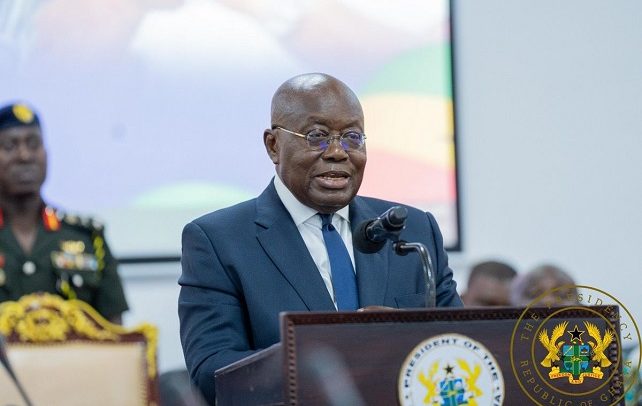President Akufo-Addo
President Akufo-Addo thinks the time has come for all to join the fight against the dreaded illegal mining, popularly known as galamsey.
The concern comes after several attempts to nib the canker in the bud seems to have hit a snag, having made modest gains in the fight.
Speaking at a two-day Natural Resources Stakeholders Dialogue in Accra yesterday under the theme: “Harnessing our Natural Resources Responsibly for our sustainable Collective Good”, he said “we must tackle head-on the issues of illegality in the extractive sector, including illegal mining and illegal logging which have over the years been a source of destruction of our waters, forests, water bodies and arable lands which have deprived us of the resources needed for development.”
“This is a collective responsibility. The government has its role, but government’s efforts will come to naught if we all fail to do our part in this exercise,” he said.
That, the President said, was “to emphasise that the protection and preservation of our natural resources requires an all hands on deck approach.”
That, he said, was because “the due exploitation of these resources has the potential to transform our country and indeed our continent.”
He has, therefore, asked all stakeholders in the natural resources sector to collaborate with the government to fight the illegalities in the country’s extractive sector.
On his part, the Minister for Lands and Natural Resources, Samuel Abu Jinapor said his ministry will soon present to Cabinet a policy document on the exploration, management, and utilisation of the country’s natural resources including lithium.
“Our goal is to ensure that as much as possible, we retain the value chain of this future and other minerals in our country,” he said.
Managing Director of the Graphic Communications Group Limited, Ato Afful, called on both government and the stakeholders to commit to taking action, learning from what has been done over time, and make a difference for the country’s environment, communities, and its future.
His reason was that illegal mining “has had a negative impact on the environment with its associated impact on deforestation, excessive water pollution and the destruction of natural habitats, fauna and flora” whilst insisting that “illegal mining or galamsey, a function of poor land usage, costs the government money and eventually harms the country’s economic progress and international brand reputation.”
Apart from that, he noted that “the impact of illegal mining on our environment and its potential implications on public health is enormous and cannot be overlooked for much longer.”
To this end, the Graphic MD gave four suggestions for primary consideration by government and other policymakers in the mining sector.
First, is to “secure a more sustainable future, we must approach natural resource management more holistically. This will entail balancing economic progress, environmental conservation, and social welfare with our revenues and growth/developmental aspirations.”
He also stressed the need to “ensure that mining and other land-use activities, are carried out in a responsible and sustainable manner that considers the preservation of the environment, and the well-being of our people.”
Mr. Afful also emphasised the need “to promote sustainable growth and protect the environment,” insisting “we the people must collaborate with government, civil society and all commercial interests in our extraction and use of natural resources.”
He also stressed the need to embrace sustainable practices in resource use and management to meet growing demands without jeopardising the interests and wellness of future generations.
The dialogue, which was organised under the auspices of the Ministry of Land and Natural Resources in collaboration with Graphic Communications Group Limited, is aimed at generating stakeholder discussions on policy suggestions that can be implemented to arrest the phenomenon of illegal mining and logging in the country.
By Charles Takyi-Boadu, Presidential Correspondent


